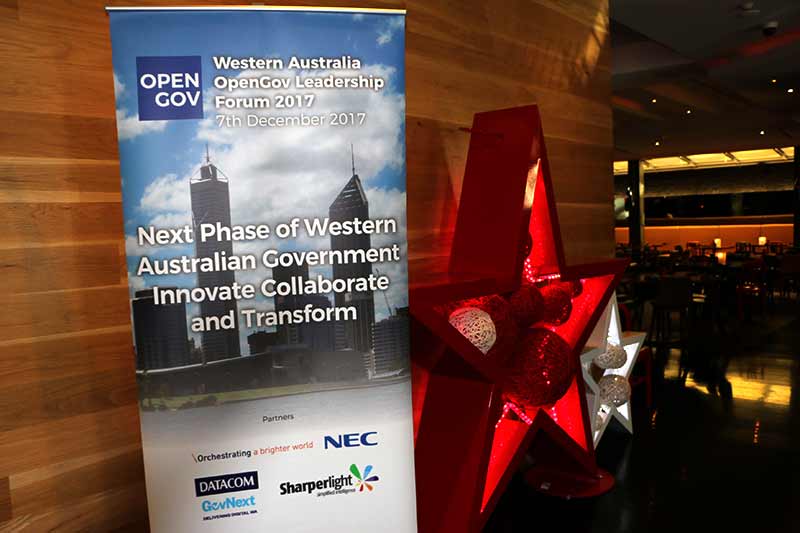
The Government of Western Australia (WA) is a critical stage
in its digital transformation journey. The Office of Office of the Government
Chief Information Officer (OGCIO) was established in July 2015, with the
mandate of 1) developing a whole-of-government ICT strategy; 2) collaborating
with government agencies and industry; 3) stabilising costs and increasing
value for money; and 4) minimising risk in the delivery of ICT across
government.
Significant progress has been made till date. A
whole-of-government ICT strategy, Digital
WA, published by the OGCIO in May 2016, seeks to position “the public
sector as a whole to use the opportunities provided by current and emerging
technologies to deliver efficient, reliable ICT services that support
exceptional public services”.
The Government’s Service Priority Review released
its final
report last week, setting out a blueprint for reform and cultural change in
Western Australia’s public sector. One of the focus areas for the review was
digital transformation within the WA Government. It takes stock of advances and
outlines the path ahead.
The report at the moment, only about 2.5 per cent of
government services in Western Australia are available online. But says that
this represents an opportunity to learn from experiences in other jurisdictions
and reimagine service provision models in WA to make services conveniently
accessible to the community, through a a mix of online, telephone and physical
service centres.
The report recommends certain structural changes in the ICT
leadership such as the transfer of policy functions associated with digital
transformation, cyber security and data sharing of the OGCIO to the Department
of the Premier and Cabinet (DPC). The Panel suggests that DPC should, as a
priority, coordinate the development of a proactive action and response plan to
address the specific cyber security risks to the State, and also that the ICT
procurement function should lie within the Department of Finance (DoF).
The only constant in the journey of digital transformation is
change. As the WA government embarks on the next stage of this journey, at the Western Australia OpenGov Leadership Forum on December 10, OpenGov
recognised eight government agencies who have achieved excellence in using ICT,
often working behind the scenes to make government smarter, more agile, more
efficient and more transparent.
This was the eighth ceremony in the OpenGov
Recognition of Excellence (RoE) series 2017, with previous ceremonies held in Canberra,
Melbourne
and Sydney
in Australia, along with Singapore,
Kuala Lumpur, Jakarta and Manila.
Below are the 8 agencies which were recognised by OpenGov,
in no specific order:
Office of the Government Chief Information
Officer

OpenGov recognised
the OGCIO, WA for its leadership role in driving the state government’s
digital transformation journey. Progress has been made since the Digital
WA ICT Strategy was unveiled last year.
The myWA Alpha site went live on 17 December
2016. The site makes it easier for the community and businesses to find
and access over 80 existing WA government services online and search across all
WA government websites. It is the first step towards the longer term aim
of a one stop shop of government digital services, as outlined in the State
Government’s Digital WA ICT strategy. As a prototype, the site shows some
of the features that could be included in the future.
GovNext-ICT is
transitioning WA Government from being an owner and operator
of ICT infrastructure towards being a consumer of commercial compute,
storage and network services. In January vendors were appointed to ensure
that Agencies will be able to purchase ICT infrastructure services on
demand, reducing procurement costs and delays. The suppliers will each
lead a consortia of local and, in some cases, national providers to
provide the services to the public sector.
The GCIO
has established the GovNext
Service Broker (GSB) to help agencies transition to the new arrangements.
The GSB will manage the contract with the vendors, which will include pricing,
performance and the delivery of new technologies for the benefit of the
sector. The new buying regime is a key milestone under the GovNext-ICT
program.
City of Perth

OpenGov recognised the
City of Perth for the Smarter
Planning Perth initiative. It is a pilot scheme involving the City of
Perth, Main Roads
WA, Water Corporation WA,
Western Power and energy provider, ATCO Australia.
The
technology enables agencies to upload their data about future capital works
onto interactive maps in the cloud. The system identifies public works
projects in close proximity and notifies their project managers of the
opportunity to share resources, potentially saving them time and money. The idea
is to prevent duplication — such as when a road is excavated and re-laid for
one set of works only to be dug up shortly after for another project. The
technology could save the City of Perth millions of dollars in the future.
Curtin University

OpenGov recognised
Curtin University for successfully
building a digital smart campus. Five years ago, the university had
no collaborative classrooms. Now it has 76 – all video-enabled with cameras
that are able to transmit in and out. It has also opened its first
180-seat classroom that is completely video conference-enabled. Curtin is
using video technology to distribute one of its nursing courses to Western
Australia’s remote north-west and plans are in place to extend offerings to
other parts of regional WA and Internationally with Curtin’s Singapore Campus.
Curtin
Converged is a model of teaching and learning that uses a mix of
traditional lectures, flipped-classes, technology enriched environments and
distributed learning techniques (Massive Online Open Courses (MOOCs) and
high-end video and 3-D technologies) that actively engage students whether they
attend classes on campus or from another location. It provides the
University a massive audience reach, eliminating the need to
confine itself to people and countries in similar time-zones. Curtin
already distributes learning to Miri (in Malaysia), and is
active in Singapore and parts of Europe. There is a partnership with
Aberdeen University in Scotland.
Recently,
an Internet-of-Things (IoT) solution was deployed in the University, which
allows the University to combine video data with operational data across its
campus facilities to provide analytics that support a smart
campus. A single analytics dashboard provides the real-time knowledge
required to make informed decisions about classes, operations and future
requirements.
Department of Fire & Emergency
Services (DFES), WA

OpenGov recognised
Openov is recognising the Department of Fire & Emergency
Services (DFES),
WA, for its adoption of a new computer aided dispatch (CAD) system, which
integrates critical information between agency databases, command centres
and frontline officers working in the field. CAD systems are the essential
information hub between public safety agencies and the general public. They
include critical information from Triple Zero (000) calls, one of the first
points of contact for community members before information is dispatched to
first responders in the field. The systems collect and collate information that
is essential to a fire and emergency worker’s daily workflow.
The new CAD
system will provide DFES with many enhanced features to enable greater
visibility of its resources for better decision making and resource management.
This includes mobility technology to provide instant and precise, mapping,
dispatch and premise hazard information to crews working on emergency response
vehicles.
DFES now
joins Western Australia Police (WAPOL)
in using the same technology platform, creating more opportunities for
collaboration between the state’s fire and emergency services and police for coordinated
incident response in the future.
Landgate

OpenGov recognised
Landgate (Landgate is the
business name of the statutory authority, the Western Australian Land
Information Authority) for
the launch of SPUR, a
location technology hub, in April 2016.
SPUR brings
together a selection of Landgate services to support businesses, start-up
companies, the location industry, the education sector and government by giving
them access to a range of resources and networking opportunities to foster the
innovation of new location-based technologies and industries.
The hub
focuses on supporting start-ups that use location information in their
businesses, although its services are available to others such as researchers
and government officials as well. Start-ups can access Landgate’s data more
cheaply with a special license, use a co-working space, get technological and
data support from Landgate’s staff, participate in networking events, and apply
for small grants from the agency.
Companies
that used maps or data from Landgate and received grants in SPUR’s first
year included BuildingApprovals, which aims to
develop a fully automated online building approval system and Landguide, which leverages real
time location data to give a true perspective of a block of land and the
surrounding location, allowing land buyers to compare features like local
amenities, schools and transportation services.
Main Roads WA

OpenGov is
recognising Main
Roads WA for the launch of its improved open data portal in
December 2016. The portal provides and traffic data, enabling the creation
of the next generation of smart transport apps.
Developers
and data users now have access to a single, searchable portal for road and
traffic information – so they can use their expertise to build innovative apps
and tools for users of Perth’s transport system.
Main Roads
data is already being used by organisations including Google to support
transport apps, making it easier for customers to plan their journeys and keep
up-to-date with traffic conditions.
Over time,
more data and functionality will become available in the Main Roads Open Data
Portal.
State library of WA

OpenGov is
recognising the State Library of WA
for Storylines, an
online image database connecting Indigenous people with their history, helping
them find historic photographs of their families and communities which are
held at the library.
Many
Indigenous communities live in remote or regional areas within the vast expanse
of WA and the only way to reach them is to go digital. Storylines uses the
software ‘Keeping Culture’ as a central database for
photos. Users can search by names or places or just browse through
the library’s collections. They can also search spatially on a Google
map, by drawing out an area and the system will find everything that
falls within that geographical space.
There is no
need for a login or a library card. It is open access and people can leave
stories and comments on each item. Anyone can submit information about the
images, such as the names of the people in them. The library can then verify it
and update Storylines and their archives. This has helped the library identify
thousands of photographs.
WA Country Health
Service

OpenGov is
recognising WA
Country Health Service for trebling the number of people in
country WA using telehealth for medical care over the past four
years. More than 30 different outpatient specialties are available to
country people via telehealth, including diabetes, respiratory illness, wound
and surgical follow-up, stroke and mental health.
There are more than 720 telehealth
videoconference units in hospitals and clinics around WA, which in 2016 saved
patients from travelling 1.8 million kms. Each week about 800
regional and outer-metropolitan patients receive medical care using
videoconferencing – either for emergency or outpatient
services. In 2015-16, there were almost 33,500 occasions of clinical
service delivered by telehealth across regional WA. There were more
than 16,500 emergency treatments, more than 5,000 mental health appointments
and almost 12,000 outpatient consultations.
















